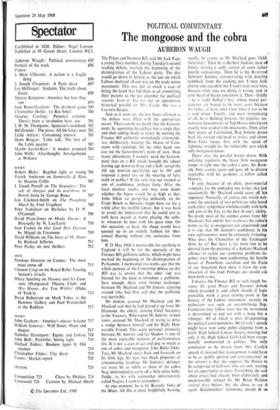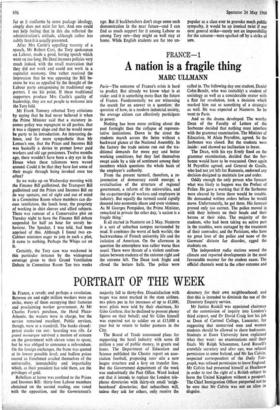The mongoose and the cobra
POLITICAL COMMENTARY
AUBERON WAUGH The Prices and Incomes Bill, said Mr Jack Page, a young Tory member, during Tuesday's second reading debate, marked the beginning of the disintegration of the Labour party. The day would go down in history as the one on which Labour declared all-out war on the trade union movement. This was not so much a case of biting the hand that fed them as of committing their parents to the gas chamber for political reasons. Joan of Arc was not an appropriate historical parallel for Mrs. Castle. She was a Lucrezia Borgia.
And so it went on; the few hours allowed to the debate were filled with the appropriate noises. There can be no doubt that the Govern- ment, by squeezing this debate into a single day, and then adding insult to injury by moving the Finance Bill guillotine immediately afterwards, was deliberately treating the House of Com- mons with contempt. On the other hand, one can see the Government's point of view. How many abstentions, I wonder, need the Govern- ment fear on a Bill which brought the school leaving age down to three and a half, raised the old age pension qualifying age to 105 and imposed a penal tax on the wearing of false teeth in public? if the vote was not treated as one of confidence, perhaps forty. After the local election results, one may even doubt whether the figure would be as high as that. John Silkin sat perspiring delicately on the Front Bench as Hercules might have sat for a while after his twelfth labour, but it was hard to avoid the impression that he could just as well have stayed at home playing the cello, or whatever he does with his spare time. On this occasion, at least, the sheep would have queued up in an orderly fashion for their annual fleecing without any assistance from him.
If 21 May 1968 is memorable for anything in England it will be for the spectacle of the Finance Bill guillotine debate, which might have marked the beginning of the disintegration of Parliament. I mentioned two weeks ago that the whole purpose of the Committee debate on this Bill was to ensure that the other side was blamed for the need to introduce a guillotine. Sure enough, there were furious exchanges between Mr Macleod and Mr Jenkins, centring around who had first said that the guillotine was inevitable.
Mr Jenkins accused Mr Macleod and Mr Macleod said that he had picked it up from Mr Diamond, the elderly looking Chief Secretary to the Treasury. Whereupon Mr Jenkins, in hurt tones, accused Mr Macleod of trying to drive a wedge between himself and his Right Hon- ourable Friend. This acute personal animosity between Mr Jenkins and his Shadow is one of the more enjoyable features of parliamentary life. It is not a case of cat and dog so much as one of cobra and mongoose. Like Rikki-Tikki- Tavi, Mr Macleod sways back and forwards on his little legs, his eyes two black pinpoints of concentrating loathing. Mr Jenkins's defences are every bit as subtle as those of the cobra Nag, determined to carry off a little white baby, Teddy, to his wife (somewhat unfortunately called Nagina, I seem to remember). At one moment, he is Sir Barnaby links of the Blues. All this is most fwightfully bawing,
weally, he yawns, as Mr Macleod goes Irikki- tikki-tikki.' Then he is Herbert Jenkins, man oil letters, writing a sniffy review of some rather puerile outpourings. Then he is the Reverend Sylvester Jenkins, remonstrating with dancing cannibals from the cooking pot. I may look plump and succulent but I won't taste very nice, because what you are doing is wrong, and in your heart of hearts you know it. Then—briefly — he is (sob) Arthur's boy, whose moral per- ceptions are bound to be most acute because his father, at least, once knew what it was to he a coal miner. Finally, and most intimidating of all, he is Bulldog Jenkins, the popular, no- nonsense housemaster of Top House who knows exactly how to deal with miscreants. Then, after their dance of fascination, Nag Jenkins draws back his wicked old head to strike, and clever Rikki-Tikki lunges first with the speed of lightning straight for the vulnerable spot which only mongooses know.
There, alas, the parallel breaks down. With unfailing regularity the brave little mongoose jumps straight into the cobra's jaws. Sir Barn- aby links yawns again and goes off to discuss vegetables with his gardener, a fellow called Hawwis.
If only because of an effete, post-imperial sympathy for the underdog one wishes that just occasionally Mr Macleod could score off his opponent. Normally, of course, one would wel- come the spectacle of two politicians who hated each other. sympathise wholeheartedly with both and join in the fray to the best of one's ability. No doubt most of the animus comes from Mr Macleod Clive and let live' is always the cobra's motto so far as mongooses are concerned) and it is true that Mr Jenkins's confidence in his own righteousness must be extremely irritating. Who does the Chancellor of the Exchequer think he is? But there is far more fun to be derived from the pretence of a JenkinS-Macleod alliance to tackle our economic problems to- gether (two brave men confronting the hostile forces of Powellism, socialism and the Facts of our Situation) than there is from the con- tinuation of this feud. Perhaps one should ask them both to tea.
I discuss the Finance Bill at such length be- cause the great Prices and Incomes debate which preceded it, and which should, if logic prevailed, mark a great turning point in the history of the Labour movement—namely its extinction—was such an overwhelming flop. Extinction may follow later, but the movement is determined to end not with a bang but a whimper. All of which is most disappointing for political correspondents. Mrs Castle's speech might have won some polite clapping from a Girls' High School Labour Society meeting but only if the High School Girls had been excep- tionally uninterested in politics. The only conclusion to be drawn from Mrs Castle's speech (it insisted that management would haVe to be as 'public spirited and cost-conscious' as the unions) is that she supposes the House to be comprised of half-wits who are only waiting for an opportunity to cheer. Everything she said about prices had already been elaborately and unanswerably refuted by Mr Brian Walden several days before, but she chose to say it again. Backbenchers' testimony, except in so
far as it conforms fo some package ideology, simply does not exist for her. And one could not help feeling that in this she reflected the administration's attitude, although rather less subtly than it is usually presented.
After Mrs Castle's appalling travesty of a speech, Mr Robert Carr, the Tory spokesman on Labour, made a good, boring speech which went on too long. He liked incomes policies very much indeed, with the small reservation that they did not work and could not work in a capitalist economy. One rather received the impression that he was opposing the Bill be- cause he was so appalled by the thought of the Labour party antagonising its traditional sup- porters. I see his point. If these traditional supporters produce Mrs Castle's quality of leadership, they are not people to welcome into the Tory fold.
Mr Frank Tomney rebutted Tory criticisms by saying that he had never believed it when the Prime Minister said that a statutory in- comes policy was repugnant to all parties, that it was a slippery slope and that he would never be party to its introduction. An interesting de- fence, and far more sympathetic than Mr Lomas's one, that the Prices and Incomes Bill was basically a device to protect lower paid workers and old age pensioners. Twelve months ago, there wouldn't have been a dry eye in the House when these talismans were waved around. Could it be that they have lost some of their magic through being invoked once too often?
So we woke up on Wednesday morning with the Finance Bill guillotined, the Transport Bill guillotined and the Prices and Incomes Bill on its way upstairs, out of sight and out of mind in a Committee Room where members can dis- cuss ventilation, the lunch hour, the propriety of working in shirt sleeves and allied subjects. There was rumour of a Conservative plot on Tuesday night to have the Finance Bill debate suspended for half an hour for unruly be- haviour. The Speaker, I was told, had been apprised of this. Although I found two ex- Cabinet ministers eager to join in such a plot, it came to nothing. Perhaps the Whips sat on it.
Certainly, the Tory case was weakened in this particular instance by the widespread coverage given to their Grand Ventilation Debate in Committee Room Ten two weeks
ago. But if backbenchers don't stage some such demonstration in the near future—and I can find as much support for it among Labour as among Tory MPS—they might as well stay at home. While English students are far too un-
popular as a class ever to provoke much public sympathy, it would be an ironical twist if our next general strike—surely not an impossibility for the autumn—were sparked off by a strike of MPS.







































 Previous page
Previous page